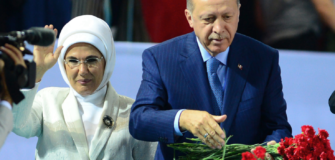Sanctions, Tariffs and War by Other Means

 The weaponization of economic instruments and the fragmentation of the global order
The weaponization of economic instruments and the fragmentation of the global order
Akey marker of regime change in the global system is the growing interaction between international commerce and brute geo- politics. Economic policy instruments are increasingly being used as tools of national interest. The current use and threatened use of tariffs and other trade restrictions by the US, China, Russia, the EU and others are one reflection of this dynamic.
So too is the weaponization of other eco- nomic policy instruments – notably sanctions. In recent decades, economic sanctions were seldom used: the principal strategic rivals in the Cold War had limited economic interaction. But globalization has made the world – and rivals – more connected.The largest states have thus begun to privilege economic and even personal sanctions to project power.
In some cases – on North Korea, Iran and Russia – these sanctions have commanded support among key Western countries. The sanctions have had material impacts: North Korean exports to China were down by around 90 percent over the past year, while exports to Russia from the Baltics and Nordics in particular, and from the Eurozone in general, remain down by about 30 percent relative to the pre-sanction environment.
Increasingly, though, economic sanctions are being used in highly capricious, unilateral and often extra- territorial ways by larger powers to advance strategic objectives. Recent US sanctions on Russia targeted specific firms and oligarchs (aluminium producer Rusal and related firm En+, associated with Oleg De- ripaska). The sanctions imposed on the Chinese tech corporation ZTE would have put it out of business, but for a political deal. And US national security adviser John Bolton has threatened to sanction officials of the International Criminal Court.
The US has coupled its withdrawal from the Iran nuclear deal with threats to impose secondary sanc- tions on firms from other countries doing business with Iran. Non-US firms with American operations, or that are banked by institutions with an American presence, will be constrained in doing business with Iran. This is an especial exposure for European firms. As the US Ambassador to Germany bluntly tweeted, “German companies doing business in Iran should wind down operations immediately.”
In response, French finance minister Bruno Le Maire noted that “[t]he international reach of US sanctions makes the US the economic policeman of the planet, and that is not acceptable.” At a time when the US seems less interested in remaining the world’s reserve currency issuer, these sanctions are perhaps the new version of the ‘exorbitant privilege’ of which then French finance minister Valéry Giscard d’Estaing warned in the 1960s. The centrality of the US dollar within the global system gives Washington sanctioning options not enjoyed by other capitals.
China, too, is using its economic muscle to ad- vance its interests, punishing parties with which it has bilateral disagreements. Japan and Taiwan have long endured various sanc- tions, and the so-called Dalai Lama effect is well established, with countries being sanctioned after receiving official visits. Norway was targeted by Beijing after the Nobel Peace Prize was awarded to activist Liu Xiaobo in 2010: tight restrictions were imposed on imports of Norwegian salmon, while Norwegian export growth to China stalled. It took seven years and considerable politicking by Oslo for Norwegian-Chinese trade in seafood to renormalize. And South Korea had its tourism sector constrained by China in 2017 for having stationed the US THAAD missile system on its territory. Top South Korean firms like Lotte and Hyundai were affected.
To be sure, economic sanctions are preferable to military conflict, and there is justification for sanc- tions in some cases. But the ad hoc application of these measures risks further fragmentation of the international system when it is already stressed by protectionism and mercantilism. Economic and financial flows may begin to circulate primarily within political blocs. Some countries may weigh the costs and benefits of transacting in US dollars or with US banks if that creates exposure to US sanctions. Such large-country behaviour may even cause firms to think hard about their global footprint, reinforcing the existing arguments for re-shoring economic activity.
New rules of the game to guide and restrain these ‘weaponized’ economic actions would be helpful, but there are no strong institutions that could provide a basis for such rules. The WTO, IMF and G20 are all unlikely candidates. And for now, the prospect of a big- power agreement on a sanctions détente seems remote.
What starts with specific, targeted sanctions may soon lead – and with some rapidity – to structural change in the operations and logic of the global sys- tem, and the emergence of a highly fragmented and deeply inefficient global economy. Bref, the open, rules-based model of globalization that has prevailed over the past several decades is coming apart.
David Skilling is Director at Landfall Strategy Group in Singapore.











